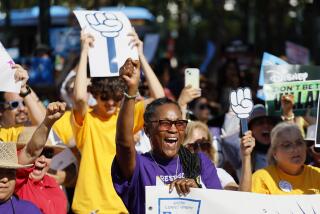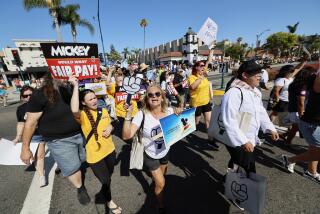McDonald’s to pay $3.75 million in dispute over worker pay at franchise restaurants
For the first time, McDonald’s has settled a case with workers who said they were subject to labor violations at franchisee-owned stores.
The company agreed to pay $3.75 million to workers who alleged that several Bay Area McDonald’s stores miscalculated their pay, denied them overtime, and did not compensate them for cleaning their uniforms, according to documents filed Friday in a U.S. District Court in San Francisco.
McDonald’s has been battling for years in courts across the country to shield itself from wage and hour claims made by workers at franchisees, and has generally succeeded. For the last several months, the company has been fighting with the National Labor Relations Board in a case being heard by an administrative judge in New York about whether it is a joint employer of workers owned by franchisees.
The most recent San Francisco case marked the first time a federal judge allowed a class to sue the company for violations at franchisee stores, based on a different interpretation of the joint employer relationship.
It could have broad implications for the company as it seeks to deny efforts by other workers to pursue it in court as a class for wage and hour violations that took place at franchisee restaurants.
The Bay Area workers argued that they reasonably believed they were employed by McDonald’s, which stamped its logo on their paychecks, uniforms and orientation materials. U.S. District Court Judge James Donato thought that argument was rational enough to be heard by a jury – a process that McDonald’s wanted to avoid.
“It’s historically significant,” says Joseph Sellers, a lawyer for the workers. “McDonald’s recognized that it had significant risk if the case went to trial, that we could have established that it was responsible for the conduct in this franchisee workplace.”
Terri Hickey, a spokeswoman for McDonald’s, said in an email that a California court had already determined that the company was not a joint employer. “We entered into this mutually acceptable resolution to avoid the costs and disruption associated with continued litigation,” Hickey wrote.
If approved by a federal judge, $1.75 million of the settlement will go to more than 800 workers and $2 million will go to lawyers for the plaintiffs. The franchisee, Smith Family LP, had already settled with the workers for about $700,000.
The same plaintiffs’ lawyers have already argued in another case, also in San Francisco, that a group of 1,200 workers at McDonald’s stores owned by a franchisee can sue the company on the theory that they rationally believed the company was their employer.
A federal judge is expected to rule on the demand for class-action status in December.
“It’s a relatively unique claim,” said Catherine Ruckelshaus, General Counsel for the nonprofit National Employment Law Project. “I think it’s going to play out in other cases against corporate McDonald’s, because McDonald’s does have this practice with its franchisees.”
Ruckelshaus said that the case showed that “the brand is strong” at franchisee McDonald’s establishments, which is why workers might be able to argue that they thought they were working for the corporate office.
The argument that McDonald’s is a joint employer simply because it was perceived as such by workers is one that the company can counter, says Seth Harris, former deputy secretary of the U.S. Labor Department. This case may open the door for new litigation temporarily, said Harris, but McDonald’s “can close the door at least a large part of the way” by getting its franchisees to make it clearer that they’re the ones employing cooks and cashiers.
Follow me @NatalieKitro on Twitter
More to Read
Inside the business of entertainment
The Wide Shot brings you news, analysis and insights on everything from streaming wars to production — and what it all means for the future.
You may occasionally receive promotional content from the Los Angeles Times.











